Regular health checkups are essential for maintaining the health and well-being of cats. Just like humans, cats also need preventative care to ensure they stay healthy and happy. Cat regular vet checkups, also known as feline wellness exams or cat health check-ups, play a vital role in monitoring your cat’s overall health and detecting any potential issues before they become serious.
By taking your cat to the vet for routine check-ups, you can ensure that they receive necessary vaccinations, proper nutrition, and dental care. These regular veterinary appointments are crucial for cats of all ages, from kittens to senior cats, to maintain optimal health and prevent the onset of diseases.
During a routine cat vet visit, the veterinarian will conduct a comprehensive physical examination of your cat, checking their weight, temperature, coat condition, and overall appearance. They will also examine the cat’s vital organs, such as the heart and lungs, to identify any potential abnormalities or signs of illness.
By investing in routine cat wellness examinations and annual cat health check-ups, you can provide your furry friend with the best preventive care available. With the guidance of your veterinarian, you can establish a solid foundation for your cat’s health and well-being, ensuring they live a long and happy life.
Key Takeaways:
- Regular cat vet checkups are crucial for maintaining your cat’s health and well-being.
- These checkups help detect any potential health issues early and ensure proper vaccination and preventive care for your cat.
- During a cat wellness examination, the veterinarian will conduct a thorough physical examination, checking vital signs and looking for any signs of illness.
- Regular vet visits can help establish a good relationship between your cat and the veterinarian, making future visits less stressful.
- By prioritizing routine vet visits, you can help ensure your cat’s long-term health and happiness.
Why are Regular Cat Health Check-Ups Important?
Regular cat health check-ups are crucial for maintaining the overall well-being of your feline friend. These check-ups allow veterinarians to closely monitor your cat’s health and detect any potential health issues early on. By scheduling regular vet visits, you ensure that your cat receives the necessary care and attention to live a long and healthy life.
There are several key reasons why regular cat health check-ups are important:
- Early Detection of Health Issues: Regular check-ups enable veterinarians to identify any potential health problems before they worsen. This includes early detection of conditions such as dental issues, arthritis, kidney disease, or cancer, which can greatly improve treatment outcomes.
- Diet and Nutrition: During health check-ups, veterinarians can assess your cat’s diet and offer guidance on any necessary adjustments. Cats’ nutritional needs may vary based on their age, activity level, and overall health condition. Regular check-ups help ensure that your cat’s dietary requirements are met for optimal health.
- Vaccination Updates: Vaccinations play a crucial role in protecting cats against various contagious diseases. Regular vet visits allow for timely updates of vaccinations to ensure your cat’s immunity is maintained and they remain protected.
- Establishing a Good Relationship: Regular vet visits also help in building a positive relationship between your cat and the veterinarian. This reduces stress and anxiety during future visits, making the experience more comfortable for your cat.
“Regular cat health check-ups are like preemptive strikes against potential health issues. They provide invaluable insights into your cat’s well-being and enable timely interventions.”
By prioritizing regular cat health check-ups, you are taking a proactive approach to your cat’s well-being. These check-ups not only ensure prompt treatment of any health concerns but also provide peace of mind for cat owners.
| Benefits of Regular Cat Health Check-Ups |
|---|
| Early detection of health issues |
| Timely vaccination updates |
| Dietary and nutritional guidance |
| Establishing a positive cat-vet relationship |
Regular vet visits are an essential part of responsible cat ownership. They contribute to the overall health, happiness, and longevity of your beloved feline companion. By maintaining a consistent schedule of cat health check-ups, you are taking a proactive approach in ensuring the best possible care for your cat.
What Does a Veterinarian Check During a Cat Wellness Examination?
During a cat wellness examination, veterinarians conduct a thorough physical examination to assess the cat’s overall health and well-being. This comprehensive evaluation includes checking various aspects of the cat’s body to detect any underlying issues or abnormalities.
Physical Examination
During the physical examination, the veterinarian will assess several key areas of the cat’s health, including:
- Weight: The veterinarian will weigh the cat to monitor its weight and ensure it is within a healthy range.
- Temperature: A cat’s body temperature is an important indicator of its health, and the veterinarian may use a rectal thermometer to check for any signs of fever or hypothermia.
- Coat Condition: The veterinarian will examine the cat’s fur and skin for any signs of parasites, allergies, or skin infections.
- Gait and Mobility: This involves observing the cat’s movements and assessing its posture, coordination, and overall mobility. Any abnormalities or difficulties in walking or jumping can indicate underlying musculoskeletal or neurological issues.
- Heart and Lungs: The veterinarian will use a stethoscope to listen to the cat’s heart and lungs, checking for irregularities or abnormal sounds that may be indicative of heart disease or respiratory issues.
Based on the preliminary examination, the veterinarian may recommend additional diagnostic tests or treatments if necessary. These may include blood tests, urinalysis, X-rays, or ultrasound scans to gain further insights into the cat’s health.
Regular cat wellness examinations are important for early detection of potential health problems and for providing necessary preventive care. They enable veterinarians to develop personalized treatment plans and make recommendations to keep cats healthy and thriving.
Tips for Maintaining General Cat Health
Proper care and maintenance are essential for ensuring the overall health and well-being of your feline companion. By paying attention to your cat’s behavior and routine, you can identify any potential issues and take appropriate measures to address them. Here are some valuable tips for maintaining general cat health:
- Monitor Eating Habits: Keep an eye on your cat’s appetite and ensure they are eating a balanced diet. Sudden changes in eating habits can be a sign of underlying health issues.
- Ensure Litter Box Use: Regularly clean the litter box to promote good hygiene and prevent urinary tract infections. A clean litter box encourages cats to use it consistently.
- Observe Activity Level: Cats should have regular opportunities for exercise and play. Encourage their physical activity through interactive toys and engaging playtime.
- Beware of Common Diseases: Familiarize yourself with common cat diseases and their symptoms, including vomiting, diarrhea, and urinary tract infections. Prompt veterinary care can prevent these conditions from worsening.
- Promote Dental Health: Dental care is crucial for preventing oral diseases in cats. Regular tooth brushing and dental check-ups can help maintain healthy teeth and gums.
| Tips for Maintaining General Cat Health | |
|---|---|
| Monitor Eating Habits | Keep an eye on your cat’s appetite and ensure they are eating a balanced diet. Sudden changes in eating habits can be a sign of underlying health issues. |
| Ensure Litter Box Use | Regularly clean the litter box to promote good hygiene and prevent urinary tract infections. A clean litter box encourages cats to use it consistently. |
| Observe Activity Level | Cats should have regular opportunities for exercise and play. Encourage their physical activity through interactive toys and engaging playtime. |
| Beware of Common Diseases | Familiarize yourself with common cat diseases and their symptoms, including vomiting, diarrhea, and urinary tract infections. Prompt veterinary care can prevent these conditions from worsening. |
| Promote Dental Health | Dental care is crucial for preventing oral diseases in cats. Regular tooth brushing and dental check-ups can help maintain healthy teeth and gums. |
Regular veterinary check-ups are vital for the early detection and treatment of any potential health issues. Consult with your veterinarian for personalized advice and guidance on maintaining your cat’s general health.
The Importance of Cat Vaccinations
When it comes to keeping our feline friends healthy, cat vaccinations play a crucial role. Vaccinations are an essential preventive measure against life-threatening diseases that can affect cats of all ages. By ensuring that your cat receives the necessary vaccinations, you are taking proactive steps to protect their health and well-being.
During regular vet check-ups, vaccinations are administered based on your cat’s lifestyle and overall health. The vaccination schedule will be tailored to meet their specific needs, ensuring they receive timely protection against diseases that pose a risk to their health.
Cat vaccinations are particularly important because they help prevent the spread of contagious diseases within the feline population. By vaccinating your cat, you not only protect their individual health but also contribute to the overall well-being of the cat community.
The Benefits of Cat Vaccinations
The benefits of cat vaccinations are significant and far-reaching. Vaccinations help protect cats from various diseases, including:
- Rabies: A viral disease that is often fatal and can be transmitted to humans.
- Distemper (Panleukopenia): A highly contagious and potentially deadly virus that affects a cat’s gastrointestinal and immune systems.
- Feline Leukemia (FeLV): A viral infection that weakens the immune system, making cats more susceptible to other infections and diseases.
By vaccinating your cat against these and other diseases, you are providing them with the best possible defense against potentially life-threatening illnesses. Vaccinations not only protect your cat from suffering but also save you from the emotional and financial burden of treating these diseases.
“Vaccinating your cat is a responsible choice that demonstrates your commitment to their health and well-being. It is a simple yet effective way to protect your furry companion from preventable diseases and ensure they live a long and happy life.” – Dr. Maria Santos, DVM
It is important to remember that vaccinations are not a one-time solution. Vaccination schedules may vary, and booster shots are often necessary to ensure continued protection. Regular vet check-ups provide an opportunity to review and update your cat’s vaccination status, ensuring their immunity remains strong.
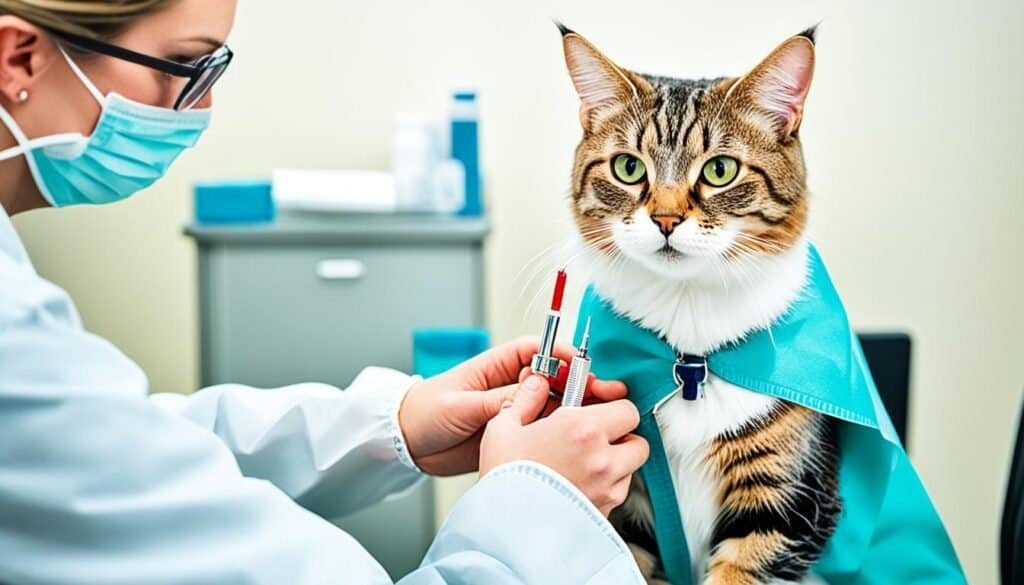
By prioritizing cat vaccinations, you are taking a proactive approach to your cat’s health and well-being. Vaccinations not only protect individual cats but also contribute to the overall prevention of contagious diseases within the feline community. Consult with your veterinarian to develop a customized vaccination plan that meets the specific needs of your cat. By doing so, you are providing them with the best chance at a long, healthy, and disease-free life.
The Benefits of Neutering or Spaying Cats
Neutering or spaying cats can have numerous health and behavioral benefits for both male and female felines. This procedure, performed by a veterinarian, involves removing the reproductive organs of the cat to prevent unwanted pregnancies and control the cat population.
Benefits of Neutering Cats:
- Eliminates the risk of testicular cancer in male cats.
- Reduces the urge to roam or mark territory with urine spraying.
- Helps prevent aggressive behavior and fighting with other cats.
Benefits of Spaying Cats:
- Eliminates the risk of mammary cancer in female cats.
- Prevents the onset of heat cycles, which can be stressful for the cat and disruptive for the owner.
- Reduces the chances of uterine infections and complications during pregnancy and delivery.
It is important to emphasize that spaying or neutering cats at a young age is highly recommended to ensure the maximum benefits. The procedure is generally safe and can be performed as early as 8 weeks of age, following the advice of a veterinarian.
“Neutering or spaying cats not only prevents unwanted litters but also plays a crucial role in maintaining their health and well-being.”
A study conducted by the American Veterinary Medical Association found that neutered or spayed cats tend to live longer, healthier lives compared to unaltered cats. In addition to the direct health benefits, neutering or spaying also contributes to reducing the stray cat population and the burden on animal shelters.
| Benefits of Neutering or Spaying Cats | Male Cats (Neutering) | Female Cats (Spaying) |
|---|---|---|
| Prevents reproductive organ-related cancers | Eliminates the risk of testicular cancer | Eliminates the risk of mammary cancer |
| Reduces behavioral issues | Reduces aggression, urine spraying, and roaming | Prevents heat cycles and associated behaviors |
| Contributes to population control | Prevents the fathering of unwanted litters | Prevents the birthing of unwanted litters |
Understanding Cat Behavior and Body Language
Understanding cat behavior and body language is essential for cat owners to ensure their feline companions’ well-being. Cats have their unique ways of communicating their needs, emotions, and even discomfort or pain. By paying attention to their behavior and body language, you can interpret their signals and respond appropriately.
One crucial aspect to observe is a cat’s tail movements. A “tail up” position usually indicates a friendly and relaxed mood, while a tucked tail may signal fear or anxiety. A wagging or flicking tail could mean excitement or irritation, depending on the context. Understanding these tail cues can help you gauge your cat’s mood and level of comfort.
Changes in a cat’s mood can also be evident in their overall behavior. For example, if your cat becomes suddenly aggressive or withdrawn, it may indicate an underlying issue that requires attention. Some cats may exhibit excessive grooming or repetitive behaviors when they are stressed or anxious. Paying attention to these behavioral changes can help you identify and address any potential concerns.
In addition to tail movements and overall behavior, other body language cues can provide insights into a cat’s emotional and physical well-being. For example, dilated pupils may suggest that a cat is either frightened or excited, while narrowed pupils may indicate aggression or pain. Ears held backward can be a sign of fear or submission, while forward-facing ears typically indicate attentiveness and curiosity.
To further understand your cat’s behavior, it can be helpful to create a behavior log. Note down any notable behaviors and their context, such as meowing, scratching, or hiding. Over time, you may notice patterns that can shed light on your cat’s preferences, stress triggers, or health concerns.
Common Cat Behavior Questions
Here are some common cat behavior questions and their answers:
-
- Why does my cat knead me?
Kneading is a behavior rooted in a cat’s kittenhood. It mimics the action of kneading their mother’s mammary glands to stimulate milk flow. Cats often knead when they feel content or seek comfort and relaxation.
-
- Why does my cat scratch furniture?
Scratching is a natural instinct for cats to mark their territory, stretch their muscles, and keep their claws sharp. Providing appropriate scratching surfaces, like scratching posts or pads, can help redirect their behavior.
-
- Why does my cat bring me gifts?
Bringing gifts, such as dead prey or toys, is a cat’s way of showing affection and providing for their human family. It is a behavior rooted in their natural hunting instincts.
Understanding and interpreting cat behavior allows you to better meet your cat’s needs, create a nurturing environment, and strengthen your bond with them.
| Cat Behavior Cues | Interpretation |
|---|---|
| Tail up | Relaxed and friendly |
| Tucked tail | Fear or anxiety |
| Wagging or flicking tail | Excitement or irritation |
| Dilated pupils | Fright or excitement |
| Narrowed pupils | Aggression or pain |
| Backward ears | Fear or submission |
| Forward-facing ears | Attentiveness and curiosity |
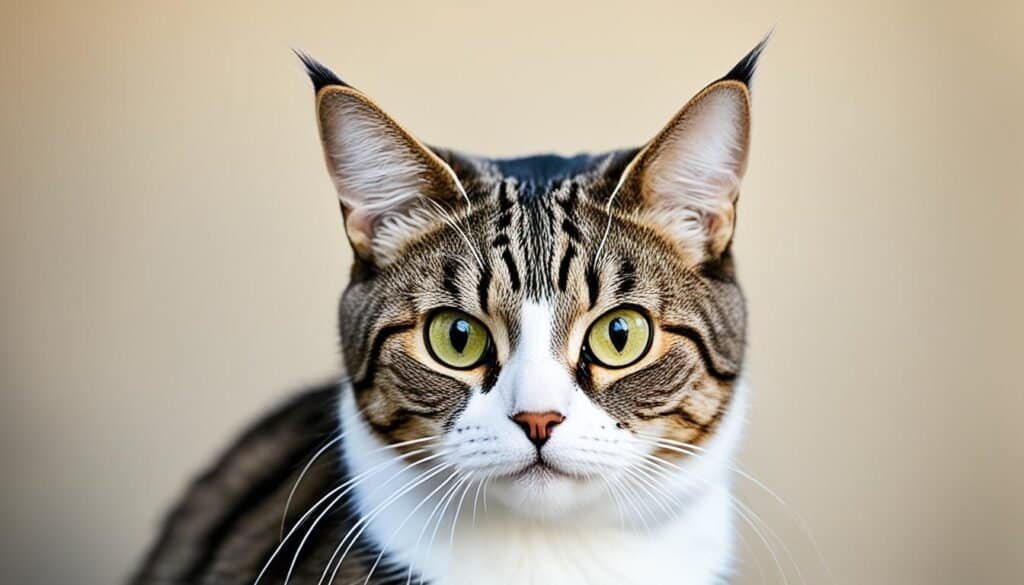
Dental Care for Cats
Dental care is an important aspect of a cat’s overall health and well-being. Just like humans, cats can develop dental issues that can cause discomfort and even lead to more serious health problems if left untreated. Most cats over the age of 4 suffer from dental issues, such as gingivitis and periodontal disease, making it crucial to prioritize their dental care.
Regular teeth cleaning and dental care routines can help prevent these problems and ensure good oral health for cats. Here are some key reasons why cat dental care is so important:
Preventing Dental Diseases
Regular dental care, including teeth cleaning and examination, can help prevent common dental diseases that cats are prone to developing. Gingivitis, for example, is a common gum disease caused by plaque buildup. If left untreated, it can progress to periodontal disease, which affects not only the gums but also the supporting structures of the teeth. Regular cleaning and proper oral hygiene can help prevent the development and progression of these diseases.
Promoting Overall Health
Dental health is closely linked to a cat’s overall health. Dental diseases can lead to discomfort, pain, and difficulty eating, which can affect a cat’s overall well-being. Additionally, bacteria from dental diseases can enter the bloodstream and potentially affect other organs, leading to more serious health issues. By maintaining good oral health, cat owners can help promote their cats’ overall health and longevity.
Preventing Bad Breath
Bad breath, also known as halitosis, is a common sign of dental issues in cats. Regular dental care can help prevent bad breath by removing plaque and tartar buildup, reducing the number of bacteria in the mouth that cause unpleasant odors. Keeping a cat’s breath fresh not only benefits their oral health but also makes cuddle time more enjoyable for cat owners.
Improving Quality of Life
Regular dental care can significantly improve a cat’s quality of life. By ensuring good oral health, cat owners can help prevent dental pain and discomfort, allowing their cats to eat and enjoy their food without any difficulties. It also helps maintain a healthy appetite and overall happiness.
Veterinary Involvement
It’s important to involve a veterinarian in a cat’s dental care routine. Regular vet check-ups should include a thorough examination of the cat’s oral health, including teeth and gums. Veterinarians can provide guidance on proper dental care techniques and recommend professional teeth cleaning when necessary. They can also address any dental issues early on, preventing them from progressing into more serious conditions.
By prioritizing dental care for cats, cat owners can ensure their feline friends have healthy teeth, fresh breath, and overall good oral health. Implementing a dental care routine at home, along with regular veterinary dental check-ups, is the key to keeping cats’ pearly whites in optimal condition.
Maintaining a Healthy Weight for Cats
Maintaining a healthy weight is crucial for a cat’s overall health and well-being. Obesity in cats can lead to serious health issues, such as diabetes and joint problems. To ensure that your cat maintains a healthy body weight, it is important to implement effective cat weight management strategies. Here are some tips to prevent cat obesity and promote a healthy weight:
- Regular Weight Checks: Schedule regular visits to the vet for weight checks. This allows you to monitor your cat’s weight and make adjustments to their diet and exercise routine as needed.
- Diet Management: Provide a balanced and nutritious diet that is appropriate for your cat’s age, breed, and activity level. Avoid overfeeding and excessive treats, as these can contribute to weight gain.
- Portion Control: Follow the recommended portion sizes provided by your veterinarian or pet food manufacturer. It is important to measure your cat’s food accurately to prevent overeating.
- Exercise and Play: Engage your cat in regular physical activity and playtime to help burn calories and maintain a healthy weight. This can include interactive toys, scratching posts, and designated play sessions.
- Monitor Food Intake: Keep an eye on your cat’s eating habits and food consumption. If you have multiple cats, ensure that each cat is eating their own appropriate portion size and not stealing food from others.
Tip: Providing environmental enrichment, such as vertical spaces and interactive toys, can help prevent boredom and reduce the risk of overeating.
By implementing these cat weight management strategies, you can help your feline friend maintain a healthy weight, reduce the risk of obesity-related health issues, and ensure their overall well-being.
Senior Cat Care
Elderly cats require special attention and care to ensure their health and well-being. Caring for aging cats involves regular health check-ups, monitoring age-related conditions, maintaining dental health, and making nutritional adjustments.
Senior cats should have health check-ups every six months instead of once a year, allowing veterinarians to closely monitor their health. These check-ups are essential for detecting and managing age-related conditions that senior cats are more prone to.
During these check-ups, veterinarians will perform a thorough examination of the cat’s overall health, paying specific attention to conditions such as arthritis, heart disease, and cancer. Regular check-ups enable early diagnosis and intervention, leading to better treatment outcomes.
Dental health is crucial for senior cats. As cats age, dental issues such as periodontal disease become more common. Regular dental cleanings and proper oral hygiene help prevent dental problems, ensuring that senior cats can eat comfortably and maintain overall health.
Nutritional adjustments are also important for senior cats. As they age, their dietary needs may change. Some cats may require a specialized senior cat food that addresses specific aging-related health concerns. Consulting with a veterinarian is essential to determine the appropriate diet for an aging cat.
The Benefits of Senior Cat Care
Caring for aging cats through regular health check-ups, dental care, and nutritional adjustments offers several benefits:
“Regular health check-ups ensure early detection of age-related conditions, leading to better treatment outcomes.”
- Promotes overall health and well-being
- Allows for early detection and management of age-related conditions
- Improves quality of life for senior cats
- Prevents dental issues and ensures comfortable eating
- Supports appropriate nutritional needs for aging cats
| Age-related Conditions | Prevalence in Senior Cats |
|---|---|
| Arthritis | Approximately 90% |
| Heart Disease | 25-35% |
| Cancer | 1 in 5 cats |
Regular health check-ups, combined with dental care and proper nutrition, are essential for providing senior cats with the best possible care. By prioritizing senior cat care, cat owners can help their beloved companions enjoy a comfortable and fulfilling life in their golden years.
Preparing Your Cat for Vet Check-Ups
Visiting the vet can be a stressful experience for cats, but there are steps you can take to make the process more comfortable for them. By preparing your cat in advance and creating a positive association with the vet, you can help reduce their stress and make future visits easier.
Reducing Cat Stress During Vet Visits
To reduce stress during vet visits, try these tips:
- Offer affection and treats before the visit: Spend some quality time with your cat before heading to the vet. This will help calm their nerves and create positive feelings associated with the experience.
- Bring their favorite toy or blanket: Having a familiar item with them can provide a sense of comfort and security in an unfamiliar environment.
- Use a small carrier: Opt for a carrier that is the right size for your cat. A cozy and secure carrier can help them feel safe and protected throughout the journey.
By implementing these strategies, you can help reduce your cat’s stress levels during vet check-ups and ensure a more positive experience for both you and your furry friend.
Building Cat Comfort During Vet Check-Ups
Building a positive association with the vet is important for your cat’s comfort during check-ups. Here are some ideas:
- Choose a cat-friendly vet: Look for a veterinary clinic that specializes in cat care and has a calm and soothing environment. This can make a significant difference in your cat’s comfort levels.
- Visit the vet for non-medical reasons: Take your cat to the vet for short visits that don’t involve treatments or examinations. This will help them become familiar with the surroundings and the staff.
- Use rewards and positive reinforcement: Reward your cat with treats, praise, and affection during and after vet visits. This will reinforce positive behavior and create a positive association with the experience.
By following these tips, you can help your cat feel more comfortable and at ease during vet check-ups, ultimately reducing their stress levels and ensuring a better overall experience.
| Benefits of Preparing Your Cat for Vet Check-Ups | Methods to Reduce Cat Stress During Vet Visits | Strategies to Build Cat Comfort During Vet Check-Ups |
|---|---|---|
| 1. Reduces cat stress levels during vet check-ups | 1. Offer affection and treats before the visit | 1. Choose a cat-friendly vet |
| 2. Creates a positive association with the vet | 2. Bring their favorite toy or blanket | 2. Visit the vet for non-medical reasons |
| 3. Eases future vet visits for the cat | 3. Use a small carrier | 3. Use rewards and positive reinforcement |
Conclusion
Regular vet check-ups are essential for ensuring the health and wellness of your beloved cat. By prioritizing these check-ups, you can take proactive measures to identify and address any potential health issues early on.
Not only do regular vet visits help in maintaining your cat’s overall health, but they also play a crucial role in preventive care. Vaccinations, tailored to your cat’s specific needs, are administered during these check-ups to protect against life-threatening diseases.
Furthermore, these check-ups provide an opportunity for your veterinarian to offer guidance on nutrition and dental care, ensuring that your cat’s dietary needs are met and their oral health is maintained. By following these recommendations, you can help promote a long and healthy life for your feline companion.
Remember, your cat’s health and well-being rely on regular vet check-ups. Make it a priority to schedule these appointments and give your cat the best possible care, ensuring that they lead a happy and healthy life.
FAQ
Why are regular cat health check-ups important?
What does a veterinarian check during a cat wellness examination?
What are some tips for maintaining general cat health?
What is the importance of cat vaccinations?
What are the benefits of neutering or spaying cats?
How can understanding cat behavior and body language help in cat care?
Why is dental care important for cats?
How can cat owners maintain a healthy weight for their cats?
What should cat owners know about senior cat care?
How can cat owners prepare their cats for vet check-ups?
Last modified: February 20, 2024

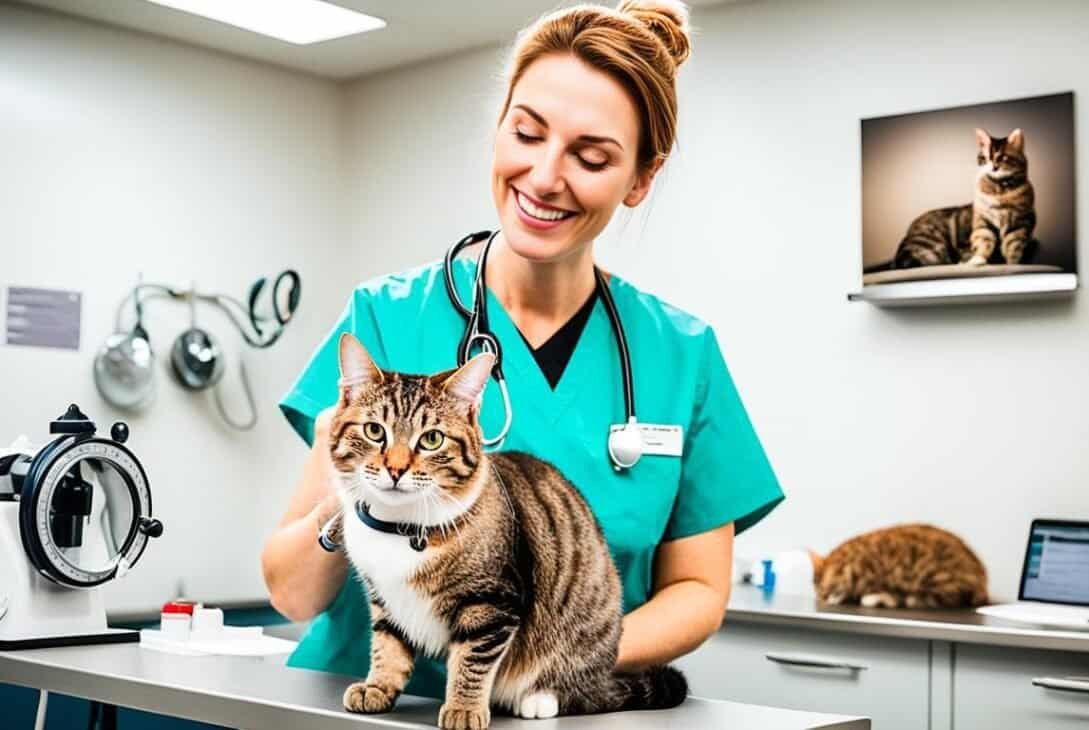
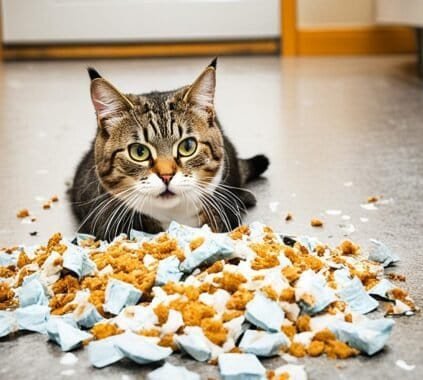
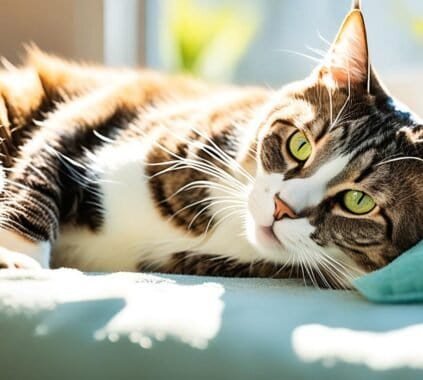
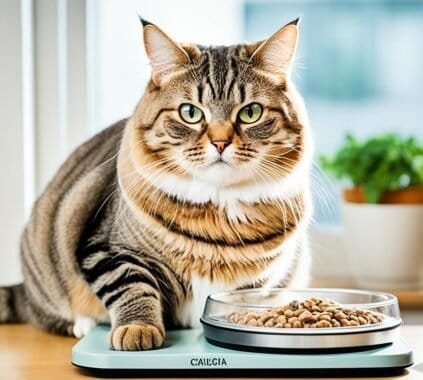



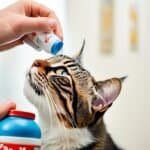





[…] cats rely on you to advocate for their health and well-being. Regular check-ups and immediate care in emergencies are essential for providing the best possible quality of life for your feline […]
[…] regular exercise opportunities to help your cat stay active and burn calories. Engage them in interactive play sessions with toys that encourage […]
[…] Essential Cat Regular Vet Checkups Guide | Philippines […]
[…] Regular monitoring of your cat’s body condition and weight is essential to ensure they maintain a healthy weight throughout their life. If you have concerns about your cat’s weight or body condition, consult with your veterinarian for guidance and support. […]
[…] checkups with a veterinarian are crucial for maintaining your cat’s dental health. These checkups go beyond just a physical examination and allow the vet to assess your cat’s oral hygiene and catch any dental issues early on. During the checkup, the veterinarian will look […]